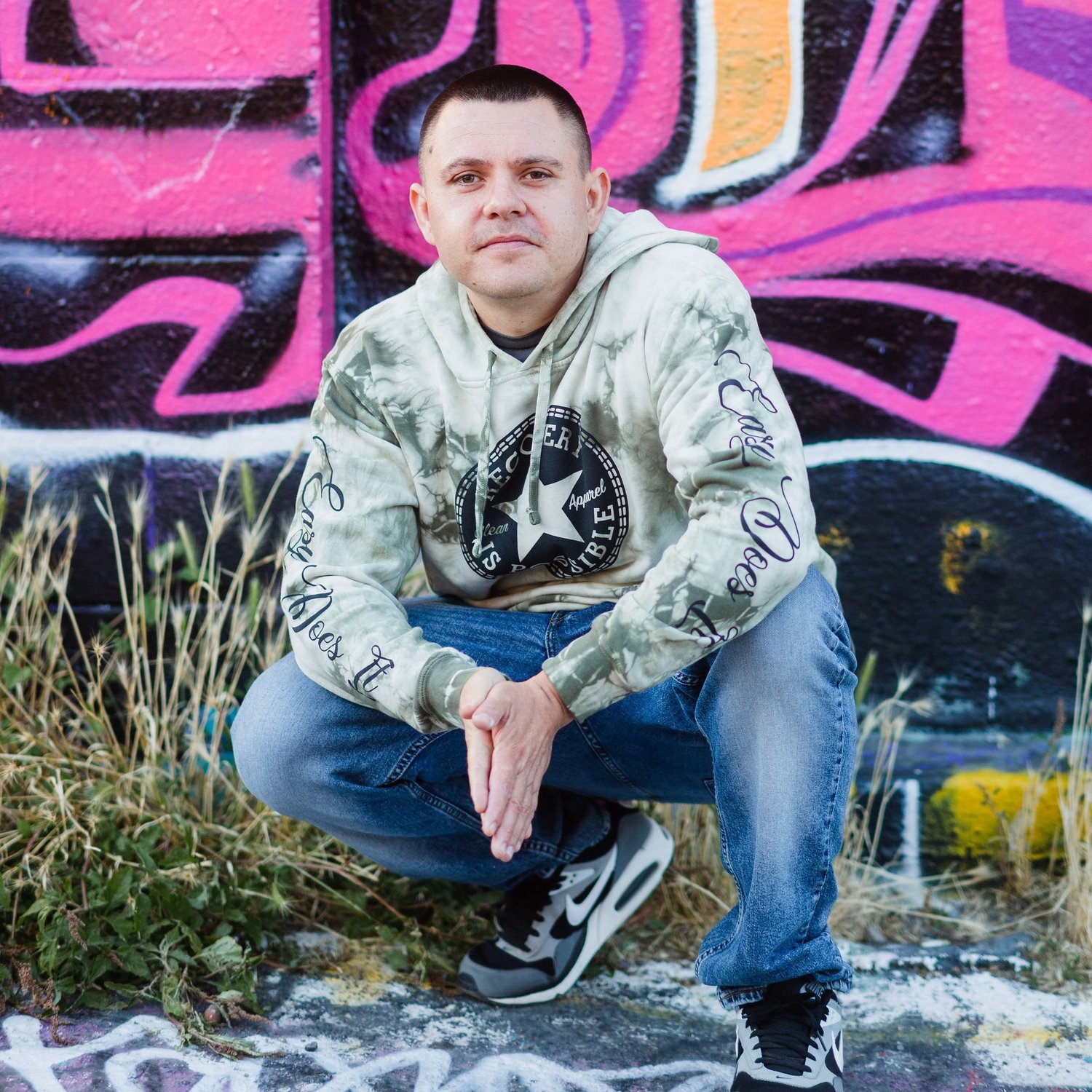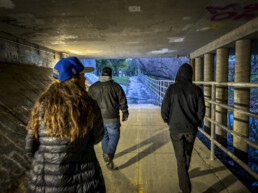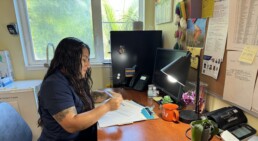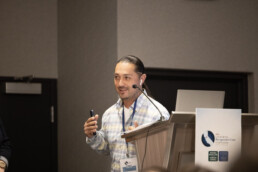Maria Foscarinis and Chris Cabral on A Novel Idea
Suzanne Lang is joined by trailblazing housing advocate Maria Foscarinis in conversation on her book And Housing for All: The Fight to End Homelessness In America.
Adding to the conversation is Chris Cabral, CEO of Petaluma’s COTS (Committee on the Shelterless).
Northern California Public Media
Jennifer B.
 Jennifer, a former client of COTS’ Kids First Family Shelter, spoke at Hops for Homes about her experience at COTS. After being welcomed to speak by COTS Program Director Garett Crane, Jennifer began by expressing deep gratitude to COTS and all the individuals who supported her and her son during the challenging period following the aftermath of COVID. Her voice wavered as that gratitude seeped into every word.
Jennifer, a former client of COTS’ Kids First Family Shelter, spoke at Hops for Homes about her experience at COTS. After being welcomed to speak by COTS Program Director Garett Crane, Jennifer began by expressing deep gratitude to COTS and all the individuals who supported her and her son during the challenging period following the aftermath of COVID. Her voice wavered as that gratitude seeped into every word.
Although Jennifer had a good job, a strong network of friends, and what appeared to be a stable life, an unexpected turn of events left her facing homelessness—something she never imagined would happen to her. Lacking sufficient family support, she quickly found herself overwhelmed and unsure of where to turn. It wasn’t until her son’s doctor referred them to COTS that a path forward began to emerge. Through that connection, she was introduced to a network of organizations that helped her and her son begin to rebuild their lives.
While staying at the Kids First Family Shelter, she and her son received essential support, including clothing, shelter, and food, providing major relief during a very stressful time. One moment Jennifer recalled most vividly was the Christmas they spent without a home. Sitting in a shelter, unable to provide for her son during the holidays, she felt heartbroken and devastated. But thanks to the generosity of sponsors and families who stepped in, they were able to experience an unforgettable Christmas. Her son called it the best Christmas he had ever had—even jokingly asking if they could stay at COTS for more Christmases.
Today, Jennifer is giving back by volunteering with some of the very organizations that once supported her. She now holds a fulfilling job, and she and her son have been living in their own apartment for nearly a year. Having previously spent years living independently, reclaiming that sense of stability has been deeply empowering. Though she has always viewed herself as resilient, her son was too young to fully grasp the challenges they faced, making their journey back to stability even more meaningful.
Recently, they were approved for more affordable housing through Burbank Housing, giving her the opportunity to remain self-reliant—something she has worked hard to achieve. She emphasized how important it is for people to understand that homelessness can happen to anyone, no matter how secure their life might seem.
She concluded by saying that this program—and the community around it—does not look at people as weak or “lesser than.” Instead, it uplifts those who’ve fallen on hard times, reminding everyone that it truly takes a community to support a family in need. While physical needs have a price, the happiness and hope given to her and her son were priceless. She extended her deepest thanks to everyone involved, saying their purpose and presence had made a life-changing impact on her family.
Chris K.
 Chris, now 33, grew up in a world full of hardship. Born in Stockton, he moved around before settling in Marin City when he was 12. Years before, his father went to prison when Chris was only 3, leaving him without a father figure. From a young age, Chris witnessed violence and found solace in substances as a way to cope with the pain. His battle with addiction spiraled, causing him to fall behind in school, get caught in the legal system, and cycle in and out of probation.
Chris, now 33, grew up in a world full of hardship. Born in Stockton, he moved around before settling in Marin City when he was 12. Years before, his father went to prison when Chris was only 3, leaving him without a father figure. From a young age, Chris witnessed violence and found solace in substances as a way to cope with the pain. His battle with addiction spiraled, causing him to fall behind in school, get caught in the legal system, and cycle in and out of probation.
By the time Chris entered his early adulthood, he had sought help through a rehab center in an effort to heal from the trauma he had never fully processed. He was in desperate need of guidance, community, and a fresh start. But life after rehab proved to be just as challenging. For the next seven years, Chris struggled to survive on the streets of Marin County, camping in various spots, constantly on the move to avoid being arrested for sleeping outside. He never felt settled, never felt safe. Each new place he was asked to leave only deepened his sense of isolation.
Chris reflects on that time, saying, “I didn’t really think that there were people out there that really wanted to help, that really could help.” But one day, when he came to the Mary Isaak Center in Petaluma for food, something shifted. He remembers, “I saw people. They were very kind and welcoming. I thought, ‘Okay, that’s a good, safe place to go.’” That kindness and sense of belonging sparked something in him, and he made the decision to return, hoping for a chance to start over.
At 25, Chris entered the Mary Isaak Center Shelter program, where he found the stability and support he desperately needed. It was there that he began his sobriety journey. During his 5-month stay, he started working at a screen-printing shop, an opportunity that would spark his passion and shape his career. After the shelter, Chris transitioned into COTS’ community housing program, first in Petaluma and then Cotati, where he lived for a couple of years.
Throughout his time in housing, Chris continued working at the screen-printing shop, moving from an entry-level position to production manager in five years. Eventually, with the retirement of his employer, Chris took a leap of faith. He bought his own screen-printing supplies and launched Clean Apparel, a recovery-focused clothing line in Santa Rosa. What started as a one-man operation soon grew, fulfilling orders from California to Florida to New York. For Chris, Clean Apparel is more than a business—it’s a way to give back and create a space where inclusivity and recovery are celebrated.
As he grew in his personal and professional life, Chris never lost sight of the struggles he had overcome. His experiences with Alcoholics Anonymous (AA) and his sponsor kept him grounded in his sobriety, and three years into his recovery journey, he became a sponsor himself. He knew how vital community and support were in the process, and he wanted to offer others the same help that had been extended to him.
Now, eight years after first walking through the doors of COTS, Chris is about to celebrate 8 years of sobriety. He spends his days giving back to his community, continuing to sponsor others on their AA journeys, and promoting Clean Apparel. Looking toward the future, Chris is excited about the possibilities—travel, playing music, and most of all, reminding others to “reach out for help and go easy on yourself. Be kind to yourself.”
Through the support of COTS and his own unwavering commitment to change, Chris has gained a second chance at life. He is proof that with the right guidance, community, and resilience, anyone can overcome the darkest of struggles and build a life full of purpose and hope.
A snapshot of homelessness in Petaluma

“I just don’t think anybody should be forgotten,” said one guide during the yearly Point-In-Time Count.
The Press Democrat
New Sonoma County homeless prevention program overwhelmed with applications
 Funded with $3.9 million in public and private philanthropy dollars, Keep People Housed partners have so far approved at least $133,542 to help people cover back rent and other outstanding bills that otherwise would put them at risk of losing housing.
Funded with $3.9 million in public and private philanthropy dollars, Keep People Housed partners have so far approved at least $133,542 to help people cover back rent and other outstanding bills that otherwise would put them at risk of losing housing.
“Things are going really well,” said Chris Cabral, chief executive officer of the Committee on the Shelterless, the administrative lead for the program. “All the partners are working really hard, and we’re getting payments out quickly, and we haven’t experienced any hiccups.”
The Press Democrat
Meet Nadya
 COTS is celebrating the one-year “work-iversary” of Nadya Cabrera, the new team lead for COTS' Recuperative Care program in the Fatima Lassar Health and Wellness Center located at COTS' main campus. She's an integral part of our Recuperative Care team.
COTS is celebrating the one-year “work-iversary” of Nadya Cabrera, the new team lead for COTS' Recuperative Care program in the Fatima Lassar Health and Wellness Center located at COTS' main campus. She's an integral part of our Recuperative Care team.
Nadya has spent her first year at COTS tirelessly coordinating medical appointments, refilling prescription medications, and closely monitoring the health of clients in COTS' Recuperative Care, which gives our unhoused neighbors a safe place to fully recover from illness, injury or surgery. A former medical assistant, Nadya works alongside the Petaluma Health Center medical team to identify and address clients’ medical needs. This primary care delivered onsite at Mary Isaak Center prevents minor medical issues from becoming emergencies.
A mother of four who enjoys caring for horses and other farm animals on her family’s property in Santa Rosa, Nadya now manages the daily operations of the COTS Recuperative Care program, overseeing the team of Recuperative Care Specialists who provide intensive supportive services that bolster clients’ life skills and facilitate smooth transitions into safe and stable housing.
“I'm grateful to COTS for trusting me with this leadership role,” says Nadya. “I really believe in the work that we do in Recuperative Care and look forward to helping the team continue to assist clients with managing their medical needs so they can move on to a better, healthier life.”
Poor physical health, especially among the older adult population, is a significant contributor to homelessness in our community. COTS is incredibly grateful for Nadya’s remarkable dedication to improving the health and well-being of this vulnerable population, and we’re honored to promote her professional growth within our organization!
Edgar's Story
A California native, Edgar, had been living in Mexico for about two years when he decided to reflect on his goals and current living situation. His bills for basic necessities were almost his entire paycheck, and Edgar struggled to find financial security.
As a native born and raised in Vallejo, he decided to return to California and rebuild a life for himself. Returning was harder than he expected, as Edgar’s previous record limited his job opportunities. As COVID-19 was ramping up, Edgar heard about businesses in Sonoma County that were desperate for employees to fill essential worker roles. He decided to take a chance and began his journey.
Arriving in Sonoma, Edgar faced life on the streets for about two months. Distressed and desperate, he began peddling drugs for money, heavily drinking, and using substances again.
Having returned to old habits, Edgar was arrested and spent a year in the county jail. His time spent in jail was an awakening. As he learned about Sonoma County resources, he was shocked to find that COTS and other shelters had support systems to assist with Social Security, medical conditions, or other needs. Thrilled by the idea of being able to change his course, he thought, "Let me go check it out, you know because I don't want to be spending the rest of my life doing time. . . . I would like to feel like a normal person."
Within a week of arriving at COTS, Edgar was accepted into our shelter, and by using COTS as a reference, he was hired on the spot at a nearby gas station. Things were changing rapidly for Edgar, but due to a miscommunication and attendance policy, the staff was forced to dismiss him from the shelter after only two months.
Returning to the streets, Edgar was unable to maintain his gas attendant job and was left with no money and no hope. He turned to a commercial burglary as his only way to provide for himself. Getting caught resulted in a 32-month sentence in state prison.
Having served 14 months, Edgar was able to get out in June 2023. The same day of his release, Edgar knew he needed to get back to COTS to change his path. Checking in with the front desk, Edgar was dealt some hard news- he would have to remain on the streets for two weeks until there would be another opening in the shelter.
When a spot was available, Edgar rejoiced at this opportunity and quickly accepted. Immediately, he began volunteering at the Mary Isaak Center and with the Downtown Streets Team. He offered free haircuts to clients and helped maintain the showers, restrooms, and other shared spaces at COTS.
Staying in the shelter for eight months, Edgar neared the end of his parole and secured a temporary six-month employment opportunity through the Downtown Streets Team.
Keeping his eyes on his goals, Edgar excelled in his new role and piqued the interest of Petaluma River Park. After he applied for their full-time position caring for the park, they quickly and happily offered him the position. He began working in May and got into the groove of new habits.
During this time, Edgar was also moving forward in finding permanent housing. Having maxed out his days available at COTS, he was referred to another housing program to complete his parole time and continue looking for a permanent solution.
Unfortunately, at his outdoor job, Edgar got a cut on his hand that resulted in hospitalization and surgery due to an infection. Being so close to getting back on his feet, Edgar spent his time in the hospital worrying about his next steps. Thankfully, COTS’ Recuperative Care (RC) program was able to accept Edgar as soon as he was discharged from the hospital’s care.
With a clean and safe space to stay, Edgar knew his hand would heal well and worked on his plan to gain housing. He worked closely with COTS’ care managers and secured a spot in COTS’ People’s Village (PV) as a stepping stone.
Upon his transition from RC to PV, Edgar also returned to his lead position with the downtown street team with assistance. With things falling back into place, Edgar found an affordable place in COTS’ Permanent Supportive Housing program.
Today, he is thriving—housed, building financial stability, and inspiring others with his journey. Speaking at the 2024 California Recuperative Care Symposium, Edgar said, “If I had landed anywhere else, I'd either still be on the streets, be dead, or be in prison.”
New Sonoma County program aims to keep as many as 400 households from falling into homelessness

The launch of Keep People Housed, a two-year pilot program designed by a Bay Area nonprofit called All Home, means individuals who meet income and other criteria can begin applying for direct financial assistance. The aid is designed to help them through periods of instability that make them vulnerable to losing their homes.
The Press Democrat
December 13, 2024
Bay Area Expands Homelessness Prevention System with New Programs in Solano, Sonoma Counties
 “An alarming number of Bay Area households are just one paycheck, job loss, or medical expense away from a housing crisis,” said Mary Kate Johnson, Director of Regional Homelessness Prevention at All Home. “All Home’s targeted homelessness prevention programs provide critical financial assistance and services to keep people housed, slowing the numbers of people becoming homeless in the Bay Area.”
“An alarming number of Bay Area households are just one paycheck, job loss, or medical expense away from a housing crisis,” said Mary Kate Johnson, Director of Regional Homelessness Prevention at All Home. “All Home’s targeted homelessness prevention programs provide critical financial assistance and services to keep people housed, slowing the numbers of people becoming homeless in the Bay Area.”
All Home
Warming Centers

Warming centers are heated public facilities where you and your family can go for relief during periods of extreme cold. Sonoma County works closely with local homeless providers to ensure needs are being met and helps augment with additional resources as needed during freeze alerts. Whenever possible, please go to the sponsoring agency’s website or call the phone numbers below BEFORE arriving to verify the warming center is open and to learn what the enrollment process is.
Sonoma County Emergency Readiness, Response and Recovery








